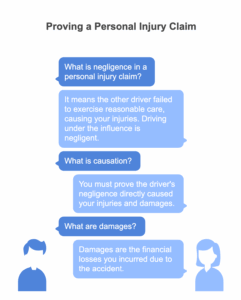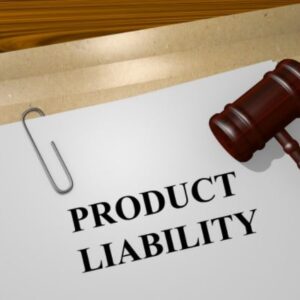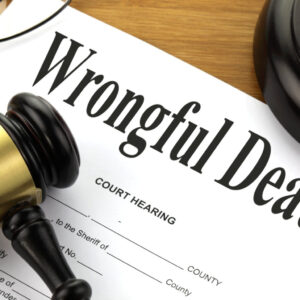A DUI accident can turn your life upside down in an instant. Dealing with injuries, vehicle damage, insurance companies, and potential legal proceedings can feel overwhelming. But you don’t have to face this alone. This guide provides a clear path from the initial chaos to securing the compensation you deserve with the help of a skilled personal injury attorney.
What to Do Immediately After a DUI Accident: Protecting Your Rights
The moments following a DUI accident are crucial. Your actions can significantly impact your health and ability to pursue a successful legal claim. Here’s what you need to do:
- Prioritise Safety: Ensure your safety and the safety of others involved. Move vehicles out of traffic if possible, but only if it’s safe.
- Call 911: Report the accident to the police. This creates an official record and ensures medical assistance arrives for anyone injured.
- Medical Attention First: Even if you feel fine, get checked by a medical professional. Some injuries, like whiplash or concussions, may not be immediately apparent. Document all medical treatment received.
- Gather Information: If you’re able, collect the following information from the other driver:
- Name and contact information
- Insurance information
- License plate number
- Driver’s license information
- Witness Information: If there were witnesses, get their names and contact information. Their testimony can be invaluable later.
- Document the Scene: Take photos and videos of the accident scene, including vehicle damage, road conditions, and visible injuries.
- Limit Communication with the Insurance Company: Avoid giving detailed statements to the other driver’s insurance company without speaking to a lawyer first. They are not on your side.
- Contact a Personal Injury Lawyer: A lawyer can advise you on your rights and protect your interests from the outset.
Understanding the Basics of a DUI Accident Case
A DUI accident case differs from a standard car accident because the at-fault driver was impaired by alcohol or drugs. This often leads to a more straightforward path to establishing negligence. However, understanding the legal landscape is essential.

- Negligence: In a personal injury claim, you must prove the other driver was negligent, meaning they failed to exercise reasonable care, which caused your injuries. Driving under the influence is, by definition, negligent.
- Causation: You must also prove that the other driver’s negligence (driving under the influence) directly caused your injuries and damages.
- Damages: Damages are the financial losses you incurred due to the accident.
Why You Need a Personal Injury Lawyer After a DUI Accident
While you can represent yourself, navigating the legal complexities of a DUI accident case without a personal injury attorney is rarely advisable. Here’s why:
- Expert Knowledge: Lawyers specialising in personal injury and DUI accidents possess a deep understanding of relevant laws, case precedents, and effective legal strategies.
- Negotiation Skills: Attorneys are skilled negotiators who can effectively deal with insurance companies to maximise your settlement. Insurance companies often try to minimise payouts, but a lawyer knows how to counter their tactics.
- Evidence Gathering: A personal injury lawyer can thoroughly investigate the accident, gather evidence, and work with experts (like accident reconstructionists) to build a strong case.
- Court Representation: If a fair settlement cannot be reached, your lawyer will represent you and advocate for your rights before a judge and jury.
- Peace of Mind: Dealing with a DUI accident is stressful. A lawyer can handle the legal aspects, allowing you to focus on your recovery.
How to Find a Top Personal Injury Lawyer for Your DUI Case
Finding the right attorney is crucial for a successful outcome. Here’s how to find a top personal injury lawyer experienced in DUI accident cases:
- Seek Referrals: Ask friends, family, or other attorneys for recommendations.
- Online Research: Use online search engines and legal directories to find personal injury lawyers in your area who specialise in DUI accidents. Look for lawyers with positive reviews and successful track records.
- Check Their Credentials: Verify the attorney’s license and disciplinary history through your state’s bar association.
- Free Consultation: Most personal injury lawyers offer a free initial consultation. This is your opportunity to discuss your case and assess whether the lawyer fits you.
- Questions to Ask Potential Lawyers:
- How much experience do you have with DUI accident cases?
- What is your success rate in these types of cases?
- What is your approach to building a strong case?
- What are your fees and payment arrangements?
- Who will be working on my case?
- How will you keep me informed about the progress of my case?
- Trust Your Gut: Choose a lawyer you feel comfortable with and who you trust to advocate for your best interests.
Building a Strong DUI Accident Case: Evidence and Strategies
A robust case rests on solid evidence and a well-defined legal strategy. Your attorney will work to gather and analyse the following:
- Police Report: The police report is a critical piece of evidence, as it documents the accident, the officer’s observations, and any charges filed against the drunk driver.
- Witness Statements: Statements from witnesses who saw the accident can provide valuable insights into what happened.
- Medical Records: Your medical records document your injuries and the treatment you received, establishing a direct link between the accident and your physical harm.
- Accident Reconstruction: In complex cases, an accident reconstruction expert may be needed to analyse the accident scene and determine the cause of the crash.
- Criminal Proceedings: The criminal case against the drunk driver can significantly impact your civil case. A guilty plea or conviction can be used as evidence of negligence in your personal injury claim. Even if the driver is acquitted, you can still pursue a civil case, as the burden of proof is lower.
- Investigative Process: Your lawyer’s investigation might involve securing surveillance footage from nearby businesses, analysing the drunk driver’s blood alcohol content (BAC), and subpoenaing cell phone records to determine if they were distracted while driving.
What is My DUI Accident Case Worth? Understanding Compensation
The value of your DUI accident case depends on various factors, including the severity of your injuries, the extent of your financial losses, and the availability of insurance coverage. You may be entitled to compensation for:

- Medical Expenses: Past and future medical bills, including hospital stays, doctor visits, physical therapy, and medication.
- Lost Wages: Compensation for lost income due to your injuries, including past and future earnings.
- Property Damage: The cost of repairing or replacing your damaged vehicle.
- Pain and Suffering: Compensation for the physical pain, emotional distress, and mental anguish you have experienced due to your injuries.
- Punitive Damages: In some cases, you may be able to recover punitive damages. Punitive damages are intended to punish the drunk driver for their reckless behaviour and deter others from driving under the influence. They are typically awarded in cases where the driver’s conduct was particularly egregious. For example, punitive damages may be more likely if the driver had multiple prior DUI convictions.
- Loss of Consortium: This covers the losses a spouse experiences due to their partner’s injury. This may include loss of companionship, affection, and sexual relations.
It is difficult to estimate the value of your case without a thorough evaluation by a personal injury lawyer. However, a lawyer can assess your damages and provide you with a realistic estimate of what your case is worth.
Navigating the Legal Process: Working with Your Lawyer to Win Your Case
The legal process can be complex and time-consuming. Your lawyer will guide you through each step, from filing a claim to negotiating a settlement or going to trial.
- Statute of Limitations: It’s crucial to understand the statute of limitations, which is the deadline for filing a personal injury claim. In most states, the statute of limitations for personal injury claims is typically one to three years from the accident date. Failing to file a lawsuit within this timeframe will prevent you from recovering compensation.
- Settlement Negotiations: Most DUI accident cases are resolved through settlement negotiations. Your lawyer will negotiate with the insurance company to reach a fair settlement that compensates you for your damages.
- Litigation: If a fair settlement cannot be reached, your lawyer will file a lawsuit and take your case to trial. During litigation, your lawyer will present evidence, question witnesses, and argue your case before a judge and jury.
- Prepare for a Consultation: Before meeting with a lawyer, gather all relevant documents, including the police report, medical records, insurance information, and photos of the accident scene. Write down a summary of what happened and a list of questions you have. This will help the consultation go smoothly and allow the lawyer to assess your case effectively.
A DUI accident can be devastating, but with the proper legal representation, you can navigate the recovery process and secure the compensation you deserve. Contact a qualified personal injury lawyer today to discuss your case and understand your legal options.




